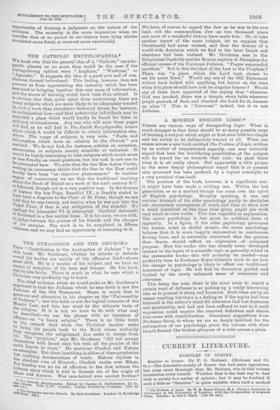A MODERN ENGLISH LOGIC.*
THEaes arc various ways of disregarding logic. What is much stranger is that there should be so many possible ways of treating a subject which might at first seem both too simple and too subtle to be deliberately treated at all. When one comes across a new book entitled The Problem of Logic, written by an author of unquestioned capacity, one may naturally expect that here the bewildering possibilities of the subject will be traced for us towards their root: we shall know what it is all really about. But apparently a title proper to the more deeply philosophical sequel that is at present only promised has been prefixed, by a logical oversight, to a very practical class-book.
The position of the book, however, is a significant one: it might have been made a striking one. Within the last generation or so a marked change has come over the spirit of English psychology. Roughly speaking, it was one curious triumph of the older pyschology partly to devitalise our elementary conceptions of mind, and then to show how a mind conceived on the lines thus given might yet work very much as ours works. This was regarded as explanation. The newer psychology is less given to artificial feats, of ingenuity. In a figure, if the older psychology portrayed the human mind in skilful mosaic, the newer psychology believes that it is more happily represented in continuous flowing lines, and is eminently concerned that the picture thus drawn should reflect an expression of animated purpose. Now the reader who has already some developed interest in the topics of a scientific logic as generally raised in the systematic books--this will probably be needed—may profitably turn to Professor Boyce Gibson's work to see how the change in psychology is likely to affect our traditional treatment of logic. He will find its discussion guided and limited by the newly enhanced sense of coherence and relevance.
This being the case, there is the more room to regret a certain want of deftness in so picking up a really interesting idea as to present it sharp end foremost. Such ideas are by no means wanting, but there is a feeling as if the topics had been laboured in the author's mind till utterance had lost freshness and spontaneity, and had not been suffered to rest in it until expression could acquire the renewed definition and charm that come with crystallisation. Occasional suggestions from Professor Stout, to whom we are so deeply indebted for the reformation of our psychology, grace the volume with their limpid fluency like broken glimpses of a river across a plain.


























































 Previous page
Previous page